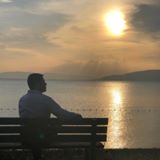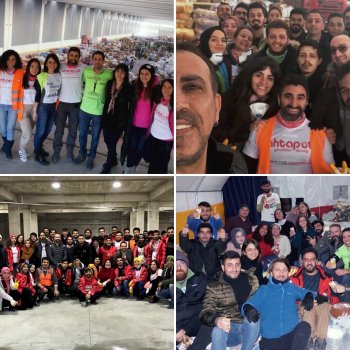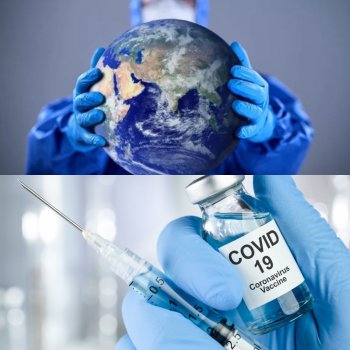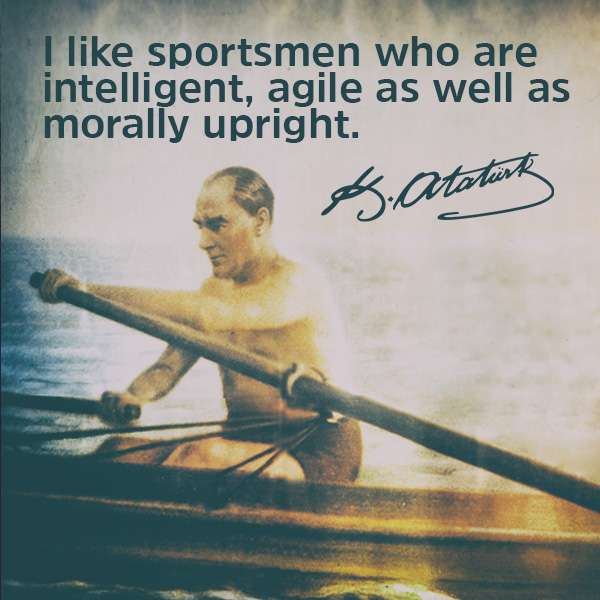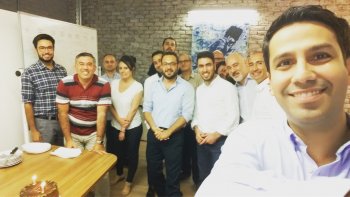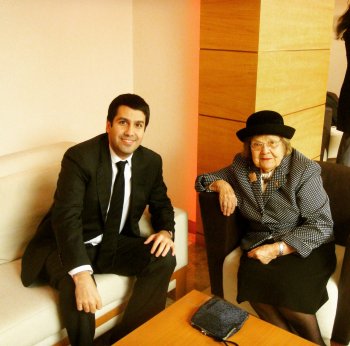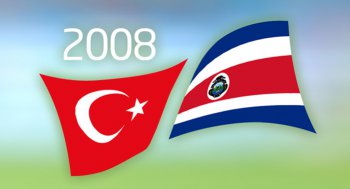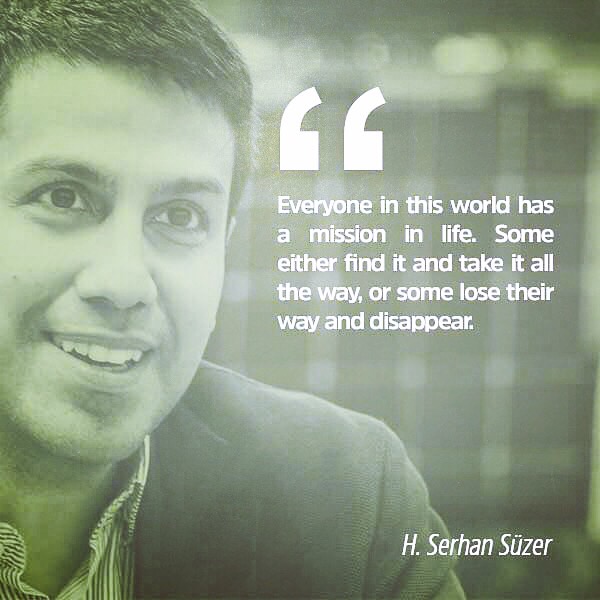Frequently Asked Questions 7
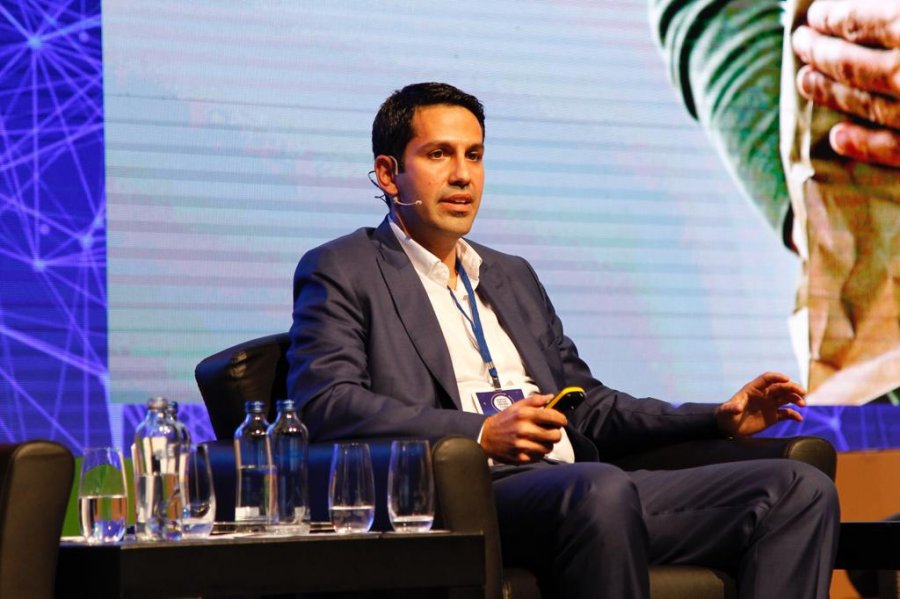
As my agenda is continually changing, I am receiving many new and different questions to answer in my “Frequently Asked Questions” series which gives me the impression that those who frequently follow my blog care to find out this information. The article you are about to read which is the 7th in the series will give an insight on my view of life, TIDER, nature, renewable energy, education projects, social entrepreneurship, food banking and my childhood dreams.
61. How do you look at life?
Everyone has a starting point in this life. Some of them are well-off, some are born in poverty. Nobody can choose their parents. We're all starting from somewhere. The important thing is not about where you start, but the difference between the place where you began and where you ended up. If you have always added value to your life, you would have lived a positive life. This should not necessarily be perceived as economically. In other words, you could have been a very good mother or father and may have raised good children for your country and for the world, which means you have made a very good contribution to humanity and had a good life yourself.
You may have served people in a CSO for a long time, which also means you have had a positive life. Of course, to achieve this, you would need to work hard and make a serious effort for it. There's also the point of enjoying life to the fullest. After all, we all exist for a certain period of time. For this reason, I choose to adopt a philosophy that is inherent to the Costa Ricans which is ‘Pura Vida’.
This philosophical approach in Costa Rica can be translated in Turkish with a similar concept known as, “beautiful life” or “positive life”. No matter how you use it, it always reflects a positive expression. My understanding of the Pura Vida lifestyle is this: Life is beautiful to the extent that it is fulfilled with meaning. That's why we have to take responsibility and try to produce what is positive and meaningful.
62. Can you give us information about TIDER? What is the founding history of your association?
Today, one of the world's most important problems are about food waste. One-third of the food produced in the world goes to the bin. In Turkey, one of every five families live below the poverty line. When I was working in the food sector, I was aware of the waste we encountered every day in our business life, and on the other hand, I was saddened to see people living below the poverty line. This observation led me to the idea of ‘we must do something about this’.
In 2009, a dinner was held in Turkey in honour of Bob Forney, who is the founding director of the Global Food Banking Network (GFN) which is one the world’s biggest food bank that aims to improve the food banks in the world and one with the most members around the globe. All of Turkey's leading food companies attended this dinner. I also attended this dinner as a manager of a food company that was looking for a social responsibility project. At this event, I was introduced to the ‘food banking” system, which was established to reduce food waste in the US and European countries and thought “why can’t we carry out something like this in our own country”.
Actually, food banking is used as a tool to fight hunger all over the world. We are actually quite lucky that Turkey’s level of hunger is not as bad as those of some countries in the world. The amount of people living under the hunger level is low. However, there are around 30 million people living under the poverty line. On the other hand, as in the world, there is a serious level of food waste in our country. The idea that led us to the foundation of TIDER was to believe that not only could we meet the basic needs of these people, but also prevent waste. With this purpose, 8 food companies came together and in May of 2010, we established the Food Banking Association as the umbrella organisation of food banking in Turkey. I was elected as the Chairman of this Association's Board of Directors.
During that time, we provided consultancy to newly established food banks with our knowledge and experience, we donated the basic needs which were food, cleaning products and clothes. When we got to the year 2014, we decided we wanted to set up a food bank, like the model we had on our minds. However, we were all aware that whilst food banking was a great tool, was it also a sustainable mechanism to continually give basic needs to people. We had the belief that while we provided these people with basic needs, we should also bring them into employment, thus, together with the food bank, we built an integrated model that aims to give them jobs and possibly become business owners.
Living under the poverty line doesn't mean trying to get by with just a little money. These people cannot afford to allocate funds for education. They do not eat enough, they can’t keep warm enough, and often have to struggle with health problems. They feel separated from society and in this case people who have to live for a long time unfortunately lose their hope for life, and their judgement about their values begin to differentiate. The problem is not just about making a little bit of money. These people are also losing their hope. Yet, a hand reaching out to them enables them to have the joy of life again and hope for the future. Furthermore, they hope to be able to stand on their own feet when a job is offered to them. As a result, in addition to providing a system of food and basic needs to the disadvantaged segments, we have developed the model of permanent solutions by offering job opportunities, therefore, we have named our foundation ‘Basic Needs Association’.
63. What do you do for nature?
As you all know, renewable energy is the most effective tool in our fight against climate change. I am the biggest advocate that we should stop using fossil fuel and move rapidly to renewable energy. In fact, in 2013, I wrote an article in the Turkish Policy Quarterly titled “Why should Turkey aim for to 100% renewable energy?”. I am one of the pioneers of solar energy in Turkey. I also work in the fields of wind and biogas.
I also have worked on organic agriculture, ecological building and water technologies. I will share these with you in the future. At this stage, I can say that we have already done a solar-power plant fed agricultural and irrigation projects.
64. In 2013, you wrote an article in the Turkish Policy Quarterly titled “Why should Turkey aim for to 100% renewable energy?”. Is this possible? If possible, how and in how much time can this become a reality?
Of course it’s possible. When I wrote this article 5 years ago, found at this link:
http://turkishpolicy.com/article/632/why-turkey-should-aim-for-100-renewable-energy-summer-2013, many people laughed at me. I came across comments such as “Isn't what you’re saying very utopic? I then responded to these comments with “soon the whole world will turn to 100% renewable energy”. I even made a bet with those who made fun of me and said, "Let's make a bet?" None of them made a bet.
At the point that we are now found, brings about more and more talks about 100% renewable targets every year. Gradually, all countries are focusing on renewable energy by releasing fossil fuel-based energy production. If there is a will of the government behind it, the 100% renewable energy target can be easily achieved within the coming 3-5 years.
5 years after the publishing of what I said in the article in the Turkish Policy Quarterly, I would like to say: 100% renewable energy will be achieved way before everyone's expectations. The fossil lobby are the ones setting the targets to 2040 or 2050. They are making these based on still being “able to make money from this for at least another 20-30 years”. I face these comments with a bitter smile. I want to give them this message: Despite all your efforts and lobbying activities, it will find its way and we will see that countries will reach the goal of 100% renewable energy long before the dates you set. Either you change the way you do business or simply disappear!
65. Will you have projects for education in the future?
At the moment, we are talking about very important issues with TIDER, but in the end, education is at the beginning of everything. I'm not talking about schooling here, in fact, there are 3 types of training that we have to touch on: First, education for those aged between 2 and 10 years of age as during this period, children’s perceptions are very strong, and they take in everything given to them. I had written an article about this on my blog in the last two months stating that in advanced societies, parents took their children to help with charity work to instill social responsibility. When those children grow up with a sense of helpfulness, they grow up with a benevolent identity and can maintain that sense of responsibility in their lives. This is really important.
The second most important education is the education of parents. Parents need to be more aware of what emotions they should instill in their child and how they should behave. There is an organisation called ACEV that deals with adult education, and it needs to spread all over Turkey. It may be a very difficult idea to implement, but I believe that couples should have a certain level of education before they have children.
The third important issue is “the education level of the educators”. When I talk to trainers/teachers, I sometimes get the feeling that they are inadequate because many things in our education system are based on being memorized. A simple example; There are 3.5 million Turks living in Germany and the Turkish athletes from there become successful worldwide, but we cannot capture the same success in Turkey considering there is almost 80 million people population. In order to understand why this is happening, I think it is necessary to look at the institutions and educators that these athletes are being trained in.
66. Can one association pull off all this work? Shouldn't this kind of work be done by the private sector?
This is the excuse of companies that make money through the social assistance system. They always tell the same story: In order for it to be sustainable, associations cannot financially afford to undertake such roles.
I’d like to say this to them. When the system is in place, CSOs can easily get more funding than what a firm's funding source can give. And at TIDER, our system is about to settle into place. Without any big investment, our association will have a very strong financial structure with only the support of thousands of people. In fact, in the future, this support will multiply into millions. As an entrepreneur, I would like to point out that a CSO can easily do the work that any company can. So, what you're doing is not rocket science. For example, with our certificate which allows us to find employment and collect a fee, we can act as a private sector organisation under TIDER’s commercial enterprise banner. There is only one difference here; instead of that the money being paid to the company’s shareholders, it is given back to the civil society to create a fund.
I've said this many times before: money earned through the social assistance system is not ethical. This money being earned must be returned to the social assistance system once again. There are many companies in the market which deceive people by introducing themselves social benefit providers. Like fossil fuel lobbies, they argue that they can do all this themselves and discredit CSO’s. I therefore, am going to prove them wrong. The reason I am shedding so much light on them comes with this message: You are going to become more and more uncomfortable. Because I will continue to make the necessary moves against the crooks like you until you take your hands away from CSO’s.
67. In Turkey, are some companies which call themselves social enterprise a scam?
We really need to separate the apples from the oranges here. There are a number of decent institutions that really deserve the right to their name, and create social benefits, and really support CSOs instead of being a burden. However, some of them are playing all kinds of games. They play with people's emotions and manipulate them, and they make the distorted system that they create seem like a system that saves the world. When people like us bring light to these kind of games, they continue to manipulate the victims by saying things like “They are getting in the way of people like us who have a bright future” However, all I have ever done and will continue to do is to help all young people who have good will and a good character. I have never supported the malicious and dishonest ones, and in fact even warned them to correct their distorted thinking structures. Today, many people are not aware of the fact that they are used by some companies who introduce themselves as a social enterprise. Unfortunately, because of these fraudsters, many people and even the social assistance system-based ones trust will be adversely affected. This is just another warning from me.
68. Is it Blog or Bloğ? (only Turkish readers would understand this)
In my previous articles, I wasn’t changing the way Blog was being written, even when an addition was being made to the word, however, when I read the TDK (Turkish Language Institution) and some related articles, I noticed that the correct way to write it was as Bloğ (the right way in Turkish). So from now on, when it comes to the word ‘blog’, I’ll make the necessary change. From now on, I will write in the sense of Bloğ.
Note to my foreign readers: Turkish is from the Ural Altaic language group and has a very different grammar structure. All inserts are appended to the end of the word and some letters change when linking the word (conjugation).
69. Can you describe what food banking is?
To explain the definition of food bank; The basic logic is that donated products are collected in one place and delivered to the needy. Food banking has 3 formats. First of all, it's the warehouse format that Americans have recommend us. Products in this format are collected, packaged and delivered to those in need, but we do not currently implement this format. We apply the market format, where people have their own right to choose what they need. Families in need of help are identified and are then invited to come to our market and according to their needs can choose products within the framework of limit given to them in the closed-circuit system. There is food, cleaning products and clothes in these markets.
In addition to the market format, there is a soup kitchen format which contains cooked food. Although it is a very difficult format, some civil society organisations successfully carry out the model. We support associations like the ‘Cling to Life Society’ which has successfully applied this model and support any other CSO’s with this support principle and will continue to do so. We also have the “Support Cloud” software and in this software, products that are to be donated are shared on this platform, then those who need these products reserve them for collection from their closest food bank and at the agreed time, they send their trucks and collect the products. This way, we automate the system as well as register everything. In our support cloud platform, donors, manufacturers, wholesalers and retailers share products, and food banks in the form of supermarkets and soup kitchen can see and share products with members. There are 20 donors and 15 food banks among our members.
70. What did you want to be when you were a child?
The first thing I remember wanting to be was a boxer, after I was influenced from the Rocky movie. I then remember changing my mind from a boxer to an astronaut. Because of the depth of space, the infinity and the urge to wonder what happens there, space had become a passion for me. I can't say I've done much about this till now, but I know that in the future, I’ll do some work on it.
Finally, after my father’s continual suggestions, I studied finance and accounting at university to become a banker. I believe I studied the wrong field. I was more fit to study engineering. Maths, physics, chemistry and biology subjects were always my best. I was not interested in social lessons like history and literature, and because I was not excited about them, my grades were low compared to other subjects. In addition, my physical education and painting lessons were always the highest.
Albeit being sarcastic, I have just as much experience and knowledge as an engineer due to my work in solar energy and related issues. I've been involved in the construction of many plants. And because I am most interested in R&D topics, I attend many R&D meetings. The important thing is to follow one's own passion. Although it may be delayed, I also have found my own way.
Tag: ekoloji
